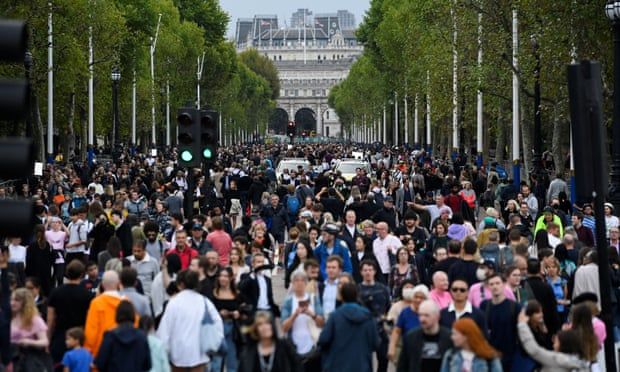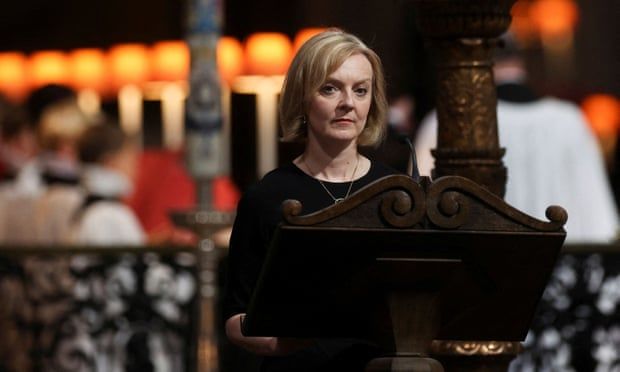
Carolean age dawns as Britain begins long goodbye to the Queen
Britain got its first glimpse of King Charles III at about 12.14pm on Friday, as television cameras filmed him getting out of his car and pausing to talk to three Aberdeen airport officials in the drizzle before climbing the stairs into a small plane to fly back to London. He was accompanied by Camilla, Queen Consort, her head beneath a transparent plastic umbrella.
It was the least pomp-filled moment of a day punctuated by ceremonial events, as Britain made a transition from one era to another.
Crowds were gathering outside Buckingham Palace as early as 6.30am. Joggers, commuters and a few people holding flags paused at the gates of the palace, jostling to photograph the black-edged official notice secured to the railings announcing that the Queen had died peacefully at Balmoral on Thursday.
When confronted by camera crews and microphones, many struggled to explain precisely why they had come, often concluding that they were there simply because they could not remember a time without the Queen.
Throughout the morning, businesses and events organisers tried to assess what the official period of mourning should mean in practical terms. Courts at the Old Bailey marked the moment by falling silent at 10am and some judges arrived wearing black-fringed mourning collars; barristers were getting used to their new titles, which had already changed from Queen’s counsel (QC) to King’s counsel (KC).
A few of London’s biggest shops, including Liberty and Selfridges, decided not to open as a mark of respect. By mid-morning, the government had published guidance stressing that there was “no obligation on organisations to suspend business during the national mourning period”, but adding that some businesses might “wish to consider” closing or postponing events, though this was entirely at their discretion.
 Crowds line the Mall in London as they arrive to pay their respects to the Queen.
Crowds line the Mall in London as they arrive to pay their respects to the Queen.
Intended to clarify things, the guidance led to a muddled response; London theatres said they would remain open, but the Proms were cancelled. The Trades Union Congress announced it was cancelling its annual conference, due to begin on Saturday, a protest in Hyde Park by Extinction Rebellion was called off, a Bank of England monetary policy committee meeting was put back, horse racing events were rescheduled and the Premier League announced that weekend fixtures would be postponed.
At Balmoral, the Queen’s closest relatives, who had been summoned on Thursday as her condition worsened, began to return home. Hints of existing strain between family members were discernible from the timetable of royal departures. Prince Harry was the first to leave at about 8.15am, barely 12 hours after arriving. He was seen making his way alone to catch a British Airways flight, a small backpack slung over his shoulder. Prince William travelled separately later in the day to return to his family.
At noon, church bells in city centres and villages tolled to mark the Queen’s death. In Westminster, a House of Commons filled with MPs in black suits was one of the day’s most striking images of mourning; the line of new faces on the government’s frontbench was also a stark reminder of how much has changed in Britain over the course of just four days, with a change of prime minister and monarch.
Beginning a two-day session to allow politicians to pay tribute to the Queen, the new prime minister, Liz Truss, said: “She was the rock on which modern Britain was built.” Using the still unfamiliar term, she declared that the nation was now entering a new “Carolean age”. She and the former prime minister Boris Johnson gave insights into how bright the Queen had been on Tuesday when they had separate audiences with her at Balmoral. Truss said: “She generously shared with me her deep experience of government, even in those last days.” The Home Office minister Tom Tugendhat shouted “God save the King” as she finished her speech. Describing his meeting, Johnson said: “in that audience, she was as radiant and as knowledgable and as fascinated by politics as ever I can remember.”
At 1pm, the BBC, which had for a second day cleared its normal schedules, cut away from the tributes to broadcast the 96-round gun salute launched simultaneously from around the country. Thousands of people gathered in near silence to watch a procession of 71 horses gallop into Hyde Park, before the 16-minute display of cannon loudly firing blanks.
By early afternoon, several florists near Green Park had sold out of flowers, but it would be wrong to suggest signs of mourning were particularly visible everywhere in the capital beyond the immediate vicinity of the palace. Elsewhere, people went to work, wore their usual clothes, ate in restaurants, travelled by tube, attended school and went shopping.
 Liz Truss gives a reading at a service at St Paul’s Cathedral in memory of the monarch.
Liz Truss gives a reading at a service at St Paul’s Cathedral in memory of the monarch.
Across London, there were only occasional, scattered signs that this was a significant day – a black band with the Queen’s face rotating at the top off the BT Tower, pictures of the late monarch on digital display panels at bus stops and, just before 2pm, the noise of TV helicopters tracking the journey of the King in a convoy along cleared roads from RAF Northolt into central London.
A vast crowd was waiting to greet him, thousands of arms stretched upwards, in the style of a rock concert, each person trying to film the moment on their phones. In the eight minutes between 2.13pm and 2.21pm, the King shook hands with more than 200 people, most of them women, lined up against barriers outside the palace. Occasionally using his left hand as well as his right, for greater efficiency, he smiled warmly and accepted one red rose, two kisses on the hand and one kiss on the cheek, before uncertainly making his way into the building.
Elsewhere, businesses were at pains to make sure they marked the moment appropriately. The government mourning advice suggested organisations could acknowledge the mourning period on their websites, “for example, with the use of black edging or black banners”. By mid-afternoon, the usually orange Sainsbury’s homepage had a black strap expressing its sorrow at the Queen’s death. Royal Mail sent out a message reassuring people that stamps with the Queen’s head on them would remain valid.
Shortly after the King’s arrival at the palace, Truss arrived for her second audience with a monarch in the space of three days. Somehow, during the day, the King managed to find time to write and record a speech to the nation.
Throughout the day choristers had been rehearsing a revised version of the national anthem, God Save the King, which was later sung for the first since 1952 at an evening prayer service at St Paul’s Cathedral.
As the service began at 6pm, the BBC and ITV simultaneously broadcast the new King’s nine-minute address, which was full of uninhibitedly affectionate expressions of love for his “beloved mother”, as well as for his “darling wife”, the new Queen Consort. In a speech clearly designed to build bridges, he made a point of saying he wanted also “to express my love for Harry and Meghan as they continue to build their lives overseas”.
He paid tribute to his mother’s “life well-lived” and her “warmth, humour and an unerring ability always to see the best in people”, before pledging to follow the “unswerving devotion” she had displayed to the nation. Ending his inaugural address as monarch, he said: “And to my darling Mama, as you begin your last great journey to join my dear late Papa, I want simply to say this: thank you.”










